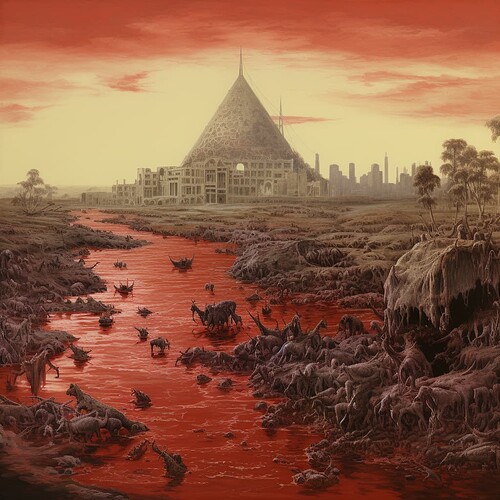Introduction: Today, we traverse the pages of Exodus 7 and 8, witnessing God demonstrating His mighty power as He embarks on a mission to liberate His chosen people from Egyptian bondage.
![]() Exodus 7: The face-off with Pharaoh
Exodus 7: The face-off with Pharaoh
This chapter reveals God’s supreme power and devolution of that power to Moses. The clashing of the staffs and Aaron’s rod turning into a snake trumps the illusory magic of Pharaoh’s sorcerers, establishing a clear divine authority.
![]() Key Verse: Exodus 7:5 - "And the Egyptians will know that I am the LORD when I stretch out my hand against Egypt and bring the Israelites out of it.”
Key Verse: Exodus 7:5 - "And the Egyptians will know that I am the LORD when I stretch out my hand against Egypt and bring the Israelites out of it.”
![]() Exodus 8: A Series of Plagues
Exodus 8: A Series of Plagues
In response to Pharaoh’s obduracy, God sends multiple plagues — frogs, gnats, and flies — each one more irritating and disastrous than the previous one, underscoring His control over all aspects of creation.
![]() Key Verse: Exodus 8:10 - "Then he said, "Tomorrow. "He said, "Be it as you say, so that you may know that there is no one like the LORD our God.”
Key Verse: Exodus 8:10 - "Then he said, "Tomorrow. "He said, "Be it as you say, so that you may know that there is no one like the LORD our God.”
![]() Key Themes and Reflections
Key Themes and Reflections
- God’s Supernatural Power: Throughout these chapters, God demonstrates His mastery over creation, affirming His position as the one true deity.
- Human Arrogance & Divine Justice: These incidents highlight how human stubbornness and arrogance, as embodied by Pharaoh, often lead to self-destruction, whereas God stands as a pillar of justice.
![]() Today’s Application
Today’s Application
These chapters remind us of the power of God in the face of human arrogance. As followers of Christ, we must adhere to humility and trust in God’s supreme authority over all challenges.
![]() Hidden Gem
Hidden Gem
Did you know Aaron’s rod was later kept in the Ark of the Covenant as a symbol of his priestly authority?
![]() Reflective Q&A:
Reflective Q&A:
*![]() What symbolism can be observed in the plagues that God sends to Egypt?
What symbolism can be observed in the plagues that God sends to Egypt?
A: The plagues demonstrate God’s dominion over nature and were specific judgments against the false gods of Egypt.
*![]() Why were the Israelites spared from the plagues?
Why were the Israelites spared from the plagues?
A: This was a testament to God’s protection and favor towards His chosen people.
*![]() How can we apply the lessons from Pharaoh’s arrogance to our life?
How can we apply the lessons from Pharaoh’s arrogance to our life?
A: These teachings remind us to remain humble and obedient to God’s will, rather than letting our pride lead us astray.
![]() Join the Discussion!
Join the Discussion!
Share your thoughts, insights and the ways you’ve personally related to these chapters.
![]() See You Tomorrow in Exodus 9-10 : We will delve deeper into God’s plan for the liberation of His people and reflect on the dire consequences of Pharaoh’s continued defiance.
See You Tomorrow in Exodus 9-10 : We will delve deeper into God’s plan for the liberation of His people and reflect on the dire consequences of Pharaoh’s continued defiance.
Let’s carry forth the understanding of God’s immense power and authority and reflect on our role as His humble servants. Stay blessed!
